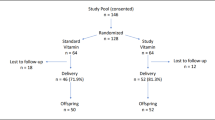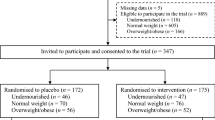Abstract
Background/Objectives:
Micronutrient deficiencies are prevalent worldwide, and a major cause of infant death. Supplementation with multiple micronutrients during pregnancy might improve micronutrient status of the newborn, thereby reducing morbidity and death. Moreover, maternal supplementation might affect the newborn's immune development. Therefore, this study investigated the effects of maternal zinc and β-carotene supplementation on the infant's morbidity and immune function during the first 6 months of life.
Subjects/Methods:
Mothers were supplemented during pregnancy with β-carotene and/or zinc, in addition to iron and folic acid, in a randomized, double-blind controlled trial. Newborn infants (n=136) were followed up for 6 months.
Results:
Infants born from mothers receiving zinc during pregnancy had significantly fewer episodes of diarrhoea than infants born from mothers not receiving zinc (0.2 and 0.4, respectively), but more episodes of cough (1.3 and 0.9 respectively) during the first 6 months. Maternal β-carotene supplementation had no effect on infants’ morbidity. Cytokine production in the newborns was affected by maternal zinc and β-carotene supplementation, with zinc supplementation giving higher interleukin-6 production (16% higher), and β-carotene supplementation leading to lower interferon-γ production (36% lower).
Conclusions:
This study shows that maternal supplementation with zinc and β-carotene affected the newborn's immune development in specific ways, but only maternal zinc supplementation significantly affected morbidity in the infants. Addition of zinc to routine iron and folic acid supplements for pregnant women could be an effective way to reduce diarrhoeal disease during the first 6 months of life, albeit at the expense of more episodes of cough.
This is a preview of subscription content, access via your institution
Access options
Subscribe to this journal
Receive 12 print issues and online access
$259.00 per year
only $21.58 per issue
Buy this article
- Purchase on Springer Link
- Instant access to full article PDF
Prices may be subject to local taxes which are calculated during checkout



Similar content being viewed by others
References
Ayah RA, Mwaniki DL, Magnussen P, Tedstone AE, Marshall T, Alusala D et al. (2007). The effects of maternal and infant vitamin A supplementation on vitamin A status: a randomised trial in Kenya. Br J Nutr 98, 422–430.
Baylin A, Villamor E, Rifai N, Msamanga G, Fawzi WW (2005). Effect of vitamin supplementation to HIV-infected pregnant women on the micronutrient status of their infants. Eur J Clin Nutr 59, 960–968.
Beaton GH, Martorell R, L’Abbe KA, Edmonston B, McCabe GP, Ross AC et al. (1992). Effectiveness of Vitamin A Supplementation in the Control of Young Child Morbidity and Mortality in Developing Countries. Final report to CIDA: University of Toronto: Canada.
Benn CS, Bale C, Sommerfelt H, Friis H, Aaby P (2003). Hypothesis: Vitamin A supplementation and childhood mortality: amplification of the non-specific effects of vaccines? Int J Epidemiol 32, 822–828.
Bhutta ZA, Bird SM, Black RE, Brown KH, Meeks Gardner J, Hidayat A et al. (2000). Therapeutic effects of oral zinc in acute and persistent diarrhea in children in developing countries: pooled analysis of randomized controlled trials. Am J Clin Nutr 72, 1516–1522.
Black RE, Allen LH, Bhutta ZA, Caulfield LE, de Onis M, Ezzati M et al. (2008). Maternal and child undernutrition: global and regional exposures and health consequences. Lancet 371, 243–260.
Christian P, Khatry SK, Katz J, Pradhan EK, LeClerq SC, Shrestha SR et al. (2003). Effects of alternative maternal micronutrient supplements on low birth weight in rural Nepal: double blind randomised community trial. Br Med J 326, 571–577.
Dijkhuizen MA, Wieringa FT, West CE, Muherdiyantiningsih, Muhilal (2001). Concurrent micronutrient deficiencies in lactating mothers and their infants in Indonesia. Am J Clin Nutr 73, 786–791.
Dijkhuizen MA, Wieringa FT, West CE, Muhilal (2004). Zinc plus beta-carotene supplementation of pregnant women is superior to beta-carotene supplementation alone in improving vitamin A status in both mothers and infants. Am J Clin Nutr 80, 1299–1307.
Doherty JF, Dijkhuizen MA, Wieringa FT, Moule N, Golden MHN (1991). Who Guidelines on Detecting Pneumonia in Children. Lancet 338, 1453–1454.
Hertz-Picciotto I, Park HY, Dostal M, Kocan A, Trnovec T, Sram R (2008). Prenatal exposures to persistent and non-persistent organic compounds and effects on immune system development. Basic Clin Pharmacol Tox 102, 146–154.
Iannotti LL, Zavaleta N, Leon Z, Shankar AH, Caulfield LE (2008). Maternal zinc supplementation and growth in Peruvian infants. Am J Clin Nutr 88, 154–160.
King JC (1990). Assessment of zinc status. J Nutr 120 (Suppl 11), 1474–1479.
Levy O (2007). Innate immunity of the newborn: basic mechanisms and clinical correlates. Nat Rev Immunol 7, 379–390.
Long KZ, Montoya Y, Hertzinark E, Santos JI, Rosado JL (2006). A double-blind, randomized, clinical trial of the effect of vitamin A and zinc supplementation on diarrheal disease and respiratory tract infections in children in Mexico City, Mexico. Am J Clin Nutr 83, 693–700.
Malaba LC, Iliff PJ, Nathoo KJ, Marinda E, Moulton LH, Zijenah LS et al. (2005). Effect of postpartum maternal or neonatal vitamin A supplementation on infant mortality among infants born to HIV-negative mothers in Zimbabwe. Am J Clin Nutr 81, 454–460.
Osendarp SJM, van Raaij JMA, Darmstadt GL, Baqui AH, Hautvast JGAJ, Fuchs GJ (2001). Zinc supplementation during pregnancy and effects on growth and morbidity in low birthweight infants: a randomized placebo-controlled trial. Lancet 357, 1080–1085.
Raqib R, Hossain MB, Kelleher SL, Stephensen CB, Lonnerdal B (2007). Zinc supplementation of pregnant rats with adequate zinc nutriture suppresses immune functions in their offspring. J Nutr 137, 1037–1042.
Rink L, Kirchner H (2000). Zinc-altered immune function and cytokine production. J Nutr 130, 1407s–1411s.
Sazawal S, Black RE, Jalla S, Mazumdar S, Sinha A, Bhan MK (1998). Zinc supplementation reduces the incidence of acute lower respiratory infections in infants and preschool children: a double-blind, controlled trial. Pediatrics 102, 1–5.
Sazawal S, Black RE, Ramsan M, Chwaya HM, Dutta A, Dhingra U et al. (2007). Effect of zinc supplementation on mortality in children aged 1-48 months: a community-based randomised placebo-controlled trial. Lancet 369, 927–934.
Schuster GU, Kenyon NJ, Stephensen CB (2008). Vitamin a deficiency decreases and high dietary vitamin A increases disease severity in the mouse model of asthma. J Immun 180, 1834–1842.
Shankar AH, Jahari AB, Sebayang SK, Aditiawarman, Apriatni M, Harefa B et al. (2008). Effect of maternal multiple micronutrient supplementation on fetal loss and infant death in Indonesia: a double-blind cluster-randomised trial. Lancet 371, 215–227.
Stephensen CB (2001). Vitamin A, infection, and immune function. Ann Rev Nutr 21, 167–192.
Tielsch JM, Khatry SK, Stoltzfus RJ, Katz J, LeClerq SC, Adhikari R et al. (2007). Effect of daily zinc supplementation on child mortality in southern Nepal: a community-based, cluster randomised, placebo-controlled trial. Lancet 370, 1230–1239.
Wellinghausen N (2001). Immunobiology of gestational zinc deficiency. Br J Nutr 85, S81–S86.
West LJ (2002). Defining critical windows in the development of the human immune system. Hum Exp Tox 21, 499–505.
WHO (1998). Safe Vitamin A Dosage During Pregnancy and Lactation. Recommendations and Report from a Consultation. Micronutrient Series. World Health Organization: Geneva.
Wieringa FT, Dijkhuizen MA, van der Meer JW (2008). Maternal micronutrient supplementation and child survival. Lancet 371, 1751–1752.
Wieringa FT, Dijkhuizen MA, van der Ven-Jongekrijg J, West CE, Muhilal, van der Meer JW (2003). Micronutrient deficiency and supplementation in Indonesian infants. Effects on immune function. Adv Exp Med Biol 531, 369–377.
Wieringa FT, Dijkhuizen MA, West CE, van der Ven-Jongekrijg J, van der Meer JW (2004). Reduced production of immunoregulatory cytokines in vitamin A- and zinc-deficient Indonesian infants. Eur J Clin Nutr 58, 1498–1504.
Zeng L, Dibley MJ, Cheng Y, Dang S, Chang S, Kong L et al. (2008). Impact of micronutrient supplementation during pregnancy on birth weight, duration of gestation, and perinatal mortality in rural western China: double blind cluster randomised controlled trial. Br Med J 337, a2001.
Acknowledgements
Funding for this research was obtained from the Ter Meulen Fund, Dutch Academy of Sciences and Arts, The Netherlands, and the Foundation for the Advancement of Tropical Research (WOTRO), The Netherlands. The funding agencies had no role in the study design, data analysis or writing of the paper.
Author information
Authors and Affiliations
Corresponding author
Ethics declarations
Competing interests
The authors declare no conflict of interest.
Rights and permissions
About this article
Cite this article
Wieringa, F., Dijkhuizen, M., Muhilal et al. Maternal micronutrient supplementation with zinc and β-carotene affects morbidity and immune function of infants during the first 6 months of life. Eur J Clin Nutr 64, 1072–1079 (2010). https://doi.org/10.1038/ejcn.2010.115
Received:
Revised:
Accepted:
Published:
Issue Date:
DOI: https://doi.org/10.1038/ejcn.2010.115
Keywords
This article is cited by
-
Interventions to Improve Micronutrient Status of Women of Reproductive Age in Southeast Asia: A Narrative Review on What Works, What Might Work, and What Doesn’t Work
Maternal and Child Health Journal (2019)
-
Prenatal Diet and the Development of Childhood Allergic Diseases: Food for Thought
Current Allergy and Asthma Reports (2018)
-
Maternal zinc supplementation improves hepatitis B antibody responses in infants but decreases plasma zinc level
European Journal of Nutrition (2016)



